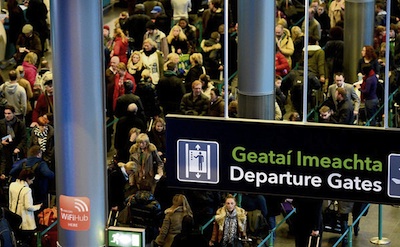
A shocking Famine-era ‘solution’ to the problem of youth unemployment has dominated this year’s announcement of Budget plans by the coalition government in Dublin.
Among a raft of drastic measures, Fine Gael’s Minister of Finance Michael Noonan revealed in his fifth austerity budget that unemployment assistance would be almost halved for those under the age of 25.
The cut means that that tens of thousands of young people will now face a difficult choice between going hungry or emigrating.
Ireland has been particularly badly affected by youth unemployment, with the youth jobless rate rising by 74pc between 2007 and 2011. Currently, the figure stands at 30pc but there are many blackspots around the country where the rate is much higher, such as Limerick and Donegal where it stands at 50pc.
Those under the age of 26 will now be forced to live on just 144 euro, while those under 25 will receive an impossible 100 euro a week -- which even Minister for Social Protection Joan Burton tacitly admitted was not a subsistence income.
The cuts could see young families forced to seek assistance from soup kitchens and other charity organisations.
The government said an apprenticeship should be taken up within four months of a young person becoming unemployed. However, even those who are lucky to find such places will be required to work a full time job on just 150 euro a week, or 3.75 euro an hour -- a fraction of the legal minimum wage.
Fianna Fail’s Dara Calleary said the government had declared a war on its people, adding that it is “expelling the country’s youngest and brightest”.
Republican Sinn Fein said the Leinster House “political elite” had targeted the most vulnerable members of society “in order to protect the interests of the wealthy”.
The attitude of the Fine Gael/Labour coalition had become reminiscent of the ‘Poor Law’ mentality of the 1840s, they said, when starvation or the coffin ship were the only options that were provided.
However, the major decisions had really been made by “the political and economic masters” in Brussels and the European Central Bank.
“This is the new face of imperialism and people must awake to the reality that they are now locked in a struggle for their very survival,” they said.
The elderly were targeted through a number of cutbacks.
The telephone allowance - worth 9.50 a month - will be abolished in the new year, while a tightening up of the eligibility for the over-70s medical cards will mean 35,000 of them lose free health care.
The loss of the Bereavement Grant of 850 euro for final expenses will mean many will not be able to afford even a dignified funeral.
Fianna Fail finance spokesman Michael McGrath said not even the dead were safe from cuts.
The Irish Senior Citizens Parliament is organising a protest march next Tuesday against the budget “attacks” on elderly people.
Age Action said the eldest had been hardest hit by this year’s budget. “The housebound, those living alone, and the sickest and poorest of older people will be hardest hit by today’s measures,” said spokesperson Eamonn Timmons.
However devastating the cuts in social welfare, the crisis in the Health services appears larger, with Minister for Health James Reilly still unable to say how a planned billion euro in cuts will be forthcoming.
The government has blindly set a target of 113 million euro in cuts through medical card “probity” -- identifying those which can be removed on some bureaucratic pretext -- but even the Minister himself said he had “concerns” about whether it could be achieved.
It is estimated that about 100,000 medical cards will have to be withdrawn in order to reach the touted 113 million figure.
An apparently random removal of medical services from extremely vulnerable individuals has made headlines in recent weeks. Children with Down’s Syndrome and cancer sufferers have had their medical cards withdrawn as part of the new “probity” measures.
Richard Boyd Barrett of People before Profit told the Dail that the Budget was depressingly predictable. He said the government had clearly “chosen as your targets, the young, the old, the sick and the chronically sick”.
On Tuesday, Sinn Fein finance spokesman Pearse Doherty said that on the 100th anniversary of the 1913 Lockout, the government was “pitting grandparent against grandchild”.
Sinn Fein deputy leader Mary Lou McDonald attacked the government’s actions and said that the Budget “to borrow a word from the Taoiseach, delivers another almighty wallop to the people”.
Ms McDonald said the Government’s targeting of low and middle-income families had been relentless and that “it sits notably and side-by-side with the protection of the wealthy”.
The party quickly launched a postcard campaign aimed at reversing the cuts to the phone allowance for the elderly, called ‘Press the Alarm for the Elderly’.
“Older people rely on the telephone as an essential lifeline,” the party said. “They need it for their alarm, to keep in touch with friends and relatives and of course the health services and community groups.”
![[Irish Republican News]](https://republican-news.org/graphics/title_gifs/rn.gif)
![[Irish Republican News]](https://republican-news.org/graphics/title_gifs/harp.gif)

